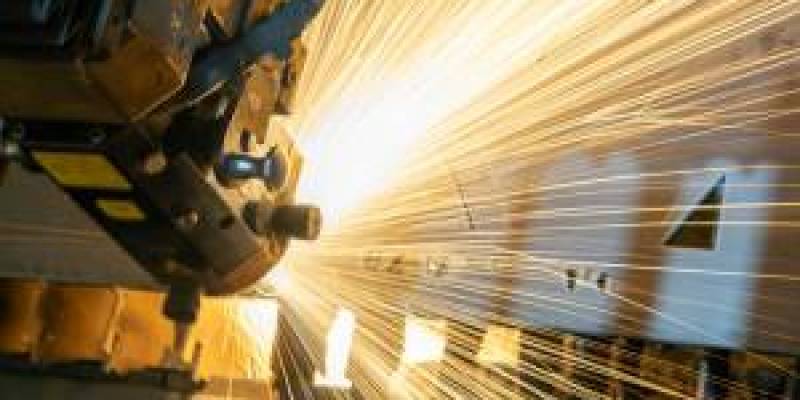Discover blockchain's impact on manufacturing.
 Deb Mukhuty
Deb Mukhuty

Discover how blockchain technology transforms manufacturing. Explore its benefits, challenges, and future implications, revolutionizing industry practices.
It's amazing how the manufacturing sector contributes significantly to the growth of the global economy. Blockchain is transforming traditional manufacturing practices by introducing decentralized ledgers that ensure trust and transparency. This technology uses cryptography to enhance security, making managing inventory, creating smart contracts, and optimizing supply chains possible. Blockchain has many applications that promise to increase productivity, cut costs, and improve the global manufacturing landscape.
According to PwC, 24% of industrial manufacturing CEOs are researching or using blockchain technology, which allows them to optimize operations, gain greater visibility into supply networks, and manage assets with unparalleled precision.
The manufacturing industry is grappling with several pervasive challenges threatening its efficiency, reputation, and overall success. Supply Chain Disruptions: Manufacturing relies heavily on supply chains, making it susceptible to disruptions caused by natural disasters, geopolitical issues, or sudden demand fluctuations, affecting production continuity.
Supply chain transformation: Unforeseen events like natural disasters or geopolitical tensions disrupt material flow, causing delays and shortages in manufacturing. Global interdependencies amplify these disruptions, impacting operations and necessitating contingency plans to mitigate their effects on production and distribution channels.
Quality control and assurance: Consistent adherence to standards, regulatory compliance, and effective defect management are critical for ensuring product reliability and safety. Continuous monitoring, rigorous testing, and swift response to defects or recalls are essential to maintain customer trust and satisfaction.
Technological integration: Incorporating new technologies demands substantial investments and expertise to merge them into manufacturing seamlessly. Optimizing processes with IoT, AI, and automation enhances efficiency and competitiveness but requires careful planning and implementation to reap maximum benefits without disruptions.
Workforce skills gap: Aligning traditional manufacturing skills with technological advancements is pivotal. According to a Gartner survey, 57% of manufacturing leaders believe their company needs more skilled workers to support innovative manufacturing digitization plans. Training and upskilling the workforce in digital literacy and specialized knowledge is essential to meet the demands of operating advanced machinery and handling sophisticated systems effectively.
Cybersecurity risks: Increased digitization exposes manufacturing to cybersecurity threats. Protecting sensitive data and infrastructure from breaches, attacks, and intellectual property theft demands robust security measures, constant vigilance, and proactive strategies to mitigate potential risks.
Environmental sustainability: Certain environmental laws must be followed to balance environmentally beneficial habits with cost-effectiveness. Minimizing waste, lowering carbon footprints, and implementing sustainable manufacturing processes are critical for aligning operations with environmental goals while maintaining profitability.
Regulatory compliance: Comprehending and adhering to multifaceted and evolving regulations at local and international levels is critical. Constant updates, compliance checks, and adjustments to manufacturing processes ensure adherence to diverse standards and legal requirements.
Innovation and product development: It is critical to balance consumer trends and rapid innovation while minimizing time-to-market. Investing in research and development, market research, and agile development methodologies is crucial for changing client expectations and preserving a competitive advantage.
Source: copperDIGITAL
Blockchain in manufacturing offers enhanced visibility, traceability, and streamlined record-keeping, ensuring transparency, accountability, and operational efficiency.
Improved supply chain visibility: Blockchain enables real-time access to accurate information about product movements, reducing delays and inefficiencies by providing transparent data across the supply chain and enhancing decision-making and operational efficiency.
Enhanced traceability and accountability: Blockchain's immutable ledger ensures transparent and traceable records, allowing stakeholders to track product origin, verify authenticity, and hold accountable parties across the supply chain, addressing issues related to counterfeiting and enhancing trust.
Streamlined record-keeping and reduced paperwork: By digitizing and securing data, blockchain minimizes paperwork, administrative tasks, and errors. This efficient record-keeping system saves time and resources and enhances overall operational efficiency within manufacturing processes.
Improved security and privacy: Blockchain's cryptographic and consensus mechanisms make data tamper-proof, enhancing security. It also allows for controlled access to sensitive information, ensuring privacy while enabling secure data sharing among authorized participants.
Reduced costs: By eliminating intermediaries, streamlining processes, and reducing administrative overheads, blockchain can significantly lower operational costs in manufacturing. Smart contracts can automate and execute agreements, reducing the need for manual intervention and associated costs.
Speed: Blockchain enables real-time transactions and data sharing, accelerating processes across the manufacturing supply chain. This speed can lead to faster decision-making, reduced lead times, and improved efficiency.
Source: esds
Manufacturing blockchain implementation has its challenges and barriers. These include the initial setup costs, potential resistance to change from stakeholders, scalability challenges as transaction volumes increase, compatibility issues with current systems, and guaranteeing data security and privacy in an open ledger system. Further challenges to broad adoption in the industrial sector include the requirement for industry-wide standards and the presence of regulatory uncertainties. To fully utilize blockchain in manufacturing, these challenges must be overcome through collaboration, technological innovations, and regulatory guidance.
Integration with existing systems: Introducing blockchain into manufacturing processes may require substantial modifications to integrate with legacy systems, potentially causing disruptions and compatibility issues, necessitating careful planning and investment in bridging the gap between new and old technologies.
Data privacy and security concerns: Blockchain's transparent and immutable nature poses a paradox—ensuring data security and privacy while maintaining the system's openness, requiring innovative solutions to encrypt sensitive information and manage access permissions effectively.
Compliance: According to the report, the most important challenge to blockchain implementation is regulatory concerns for 27% of respondents, 26% of whom are headquartered in the US. Adhering to diverse and evolving regulations demands meticulous attention to legal frameworks, posing complexities in ensuring that blockchain implementations align with specific industry standards, international laws, and data protection requirements across jurisdictions.
Scalability concerns revolve around managing increased transactions without compromising speed. Cost considerations include initial setup, infrastructure, and energy expenses. Resolving these demands innovations in consensus algorithms and scalable infrastructure to ensure efficiency while controlling operational costs in manufacturing blockchain adoption.
The future of blockchain in manufacturing appears promising, poised to redefine industry standards. Advancements in supply chain visibility, smart contracts, and decentralized platforms will streamline operations. Its integration will fortify trust, minimize fraud, and ensure data integrity. As adoption grows and technology matures, blockchain's transformative impact will lead to a more interconnected, secure, and efficient manufacturing landscape, reshaping traditional practices into a more agile and transparent ecosystem.
According to IBM, while looking to the far future of blockchain is tremendously exciting, new developments are continually entering the market, offering bigger and bolder uses of the technology. Its potential benefits, including enhanced traceability and streamlined operations, signal a promising future for the industry. Despite challenges, continued innovation and adoption will reshape manufacturing, fostering a more efficient, trustworthy, and interconnected ecosystem.
How can blockchain reshape the industry? Let us know on Facebook, Linkedin or Twitter.